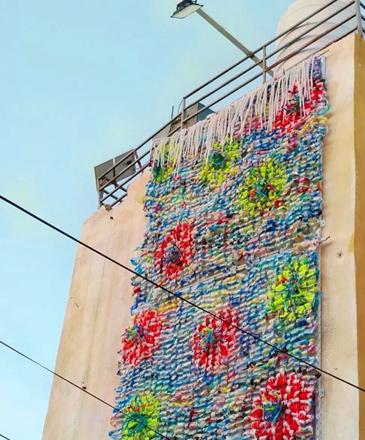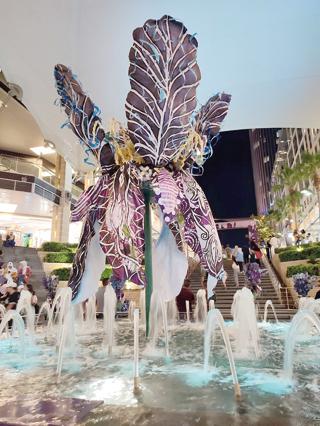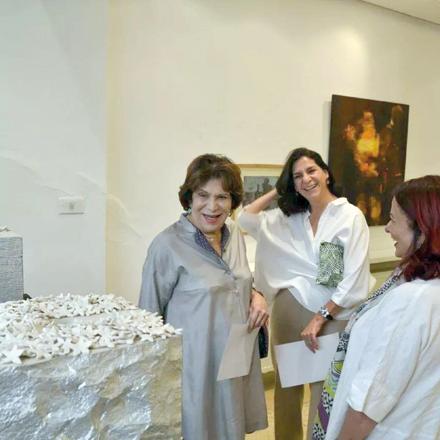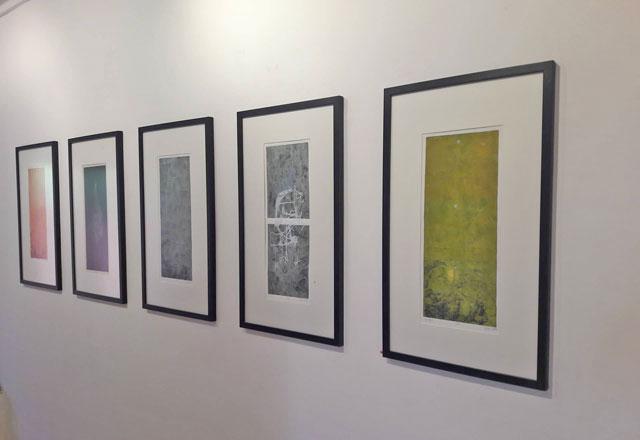You are here
Artist on mission to end pollution crisis using unconventional methods
By Maria Weldali - Sep 12,2021 - Last updated at Sep 12,2021

Art work of Maria Nissan on a wall in Amman’s Jabal Al Natheef, using 978 bags, 2,205 bottles, 153 shisha pipes and 70 caps (Photo courtesy of Maria Nissan Instagram account)
AMMAN — An Iraqi artist uses her art to speak to the realities of the worsening plastic crisis.
Maria Khalid Nissan, 34, is an environmentally conscious Jordan-based Iraqi artist and activist, who describes herself as “an Assyrian environmental artist”.
She believes that her culture and roots have helped form an identity that is persistent in each one of her installations and drawings.
Almost 10 years ago, Nissan dropped out of college after having difficulties choosing a major and worked as a flight attendant for a year. Afterwards, she knew what she wanted and decided that “art was her thing”.
“Art has been my constant. It is the only thing that stuck with me and I just fell in love,” said Nissan in an interview with The Jordan Times.
“I love that moment when my creativity defeats the failed attempts of using trash as an art form,” Nissan said.
Nissan became an artist to respond to the toll plastic pollution has on the planet. She raises awareness about ongoing environmental issues through creating large scale installations “to give a more dominant perspective of what is happening in the world”.
Plastic Oceans, one of Nissan’s biggest projects, sheds light on people’s obsession with plastic consumption. The project expanded after Nissan settled in Amman two and a half years ago.
She said that she started her Plastic Oceans project in 2019, “using 380 used plastic bags that were fused and transformed into monumental sculptural wave forms as a reflection of the hard edges of consumer consumption”.
“We are the first generation to witness the effects of global warming and the last one that can do something about it,” Nissan wrote on her Instagram page, calling on people to join her to end the consumption of single-use plastics, which she described as “indestructible material that is killing our planet”.
Plastic bags and cups, sheesha pipes, coffee filters and other discarded plastics normally end up in landfills, but Nissan has transformed those items into essential components of her art.
“A plastic bag that is only used for 10 minutes can last up to thousands of years and then slowly breaks into smaller and smaller particles called micro-plastics, thereby affecting all aspects of our lives,” said Nissan.
She added that using plastic is within people’s control, as “we can just choose not to buy plastic. It is that simple”.
The artist leads a freestyle attitude and had her first solo exhibition in 2014 in Georgia, the United States.
When she moved to Italy in 2016 to pursue a Masters of Fine Arts (MFA) from Studio Arts College International (SACI), she was interested in the country’s social settings and culture, especially Italians’ social interactions around coffee. This inspired her to create a gallery of coffee filters from the filters she had gathered from Georgia throughout a year.
“Used coffee filters are usually thrown away, which makes the installation a huge recycling project, within which I incorporated my childhood memories of coffee,” Nissan said.
She pointed out that she had another major art installation using 440 used plastic cups in Athens, Greece, in addition to many other exhibitions and galleries.
“During my time in Jordan, I have had 14 to 15 projects,” the artist noted, adding that she is doing window displays of plastic bottles and has other exhibitions and galleries.
The definition of art in Nissan’s own textbook is “anything a person puts their time, energy and passion into. The process is art”.
Related Articles
AMMAN — Environmental artist Maria Nissan is fighting against single-use plastics in Jordan by turning plastic waste into art. In colla
AMMAN — “Summer Exhibition: Paintings, Sculptures and Ceramics” is showcasing the artwork of 15 Arab artists at the Foresight32 Art Ga
AMMAN — “Art is not accessible for everyone to enjoy it and I wanted to show that it can and should be,” said Lina Salah, a 22-year-old arti



















